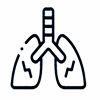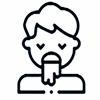OUR COVID-19 RESPONSE
• Hashmanis Group of Hospitals was one of the first to provide home, office, drive-thru and walk-in covid-19 testing services through Hashmanis Laboratory.
• Opened and expanded with over 20 Hashmanis laboratory collection points, 4 dedicated covid-19 testing centers and molecular laboratories catered to deliver rapid testing and vaccination facilities easily accessible across Pakistan.
• Distributed a number of Personal Protective Equipment (PPE) and safety measures.
• Conducted complete covid-19 testing services including Antibody ICT, Antibody Elisa, Antibody CLIA, PCR among others.
• Record of conducting over 1000 covid-19 tests daily.
• Record of testing over 500 individuals daily.
• Introduced Covid-19 Variant Detection System in Pakistan; latest UK based technology that helps identify which type of variant or mutation has hit one to aid in designing enhanced and specialized treatment protocols for patients.
• Led numerous awareness campaigns through different digital, marketing and PR mediums.
• Free testing and vaccination services to the under-privileged through Hashmanis Medical Welfare Foundation.
• Credited and authorized by the Sindh Health Care Commission to run licensed, safe and secure vaccination and testing services and centers.



COVID-19 SYMPTOMS
– HEALTH CARE
Symptoms Of COVID – 19

Body Temperature
- 100.4 F° (38 C°) or higher temperature
- Persistent Low-grade fever, with gradual increase in temperature

Prolonged Cough
- Persistent coughs for an hour or the entire day
- Severe coughs

Shortness Of Breath
- Unable to take full or deep breaths
- Difficulty catching breath

Other
- Sore Throat
- Congestion or runny nose
- Fatigue
- Muscle or body aches
- Headache
- Diarrhea
- Nausea or vomiting
- Loss of taste or smell
- Skin rashes or discolored fingers and toes

Body Temperature
- A low-grade fever that gradually increases
- If a temperature is 100.4 F° (38 C°) or higher

Prolonged Cough
- If your cough gets severe over time
- If the cough is persistent for an hour, or if it persists for a day

Shortness Of Breath
- If you feel suffocated
- Unable to catch breath

Other Symptoms are
- Sore Throat
- Aches and joined pains
- Fatigue
- Diarrhea
- Sputum, or coughed up mucus and saliva
- Nausea
- Rash on skin or discoloration of fingers and toes
- Vomiting
- Loss of sense of smell and taste

– COVID VICTIMS
How To Protect Yourself
Imagine living in a world where you don’t feel safe, and every day is a challenge to survive. There are regions where people do live like this, unfortunately. We highly recommend you follow these rules.

Non-perishable food

Bottled Water

First Aid Kit

Warm Clothing

Baby Supplies

Pet Supplies
How To Protect Yourself
The following COVID-19 precautions and measures has helped reduce the chances of contracting the virus worldwide.

Non-perishable food

Bottled Water

First Aid Kit

Warm Clothing

Baby Supplies

Pet Supplies
COVID-19 PRECAUTIONS
Wash Your Hands Frequently
- Wash hands regularly with soap and water for at least 20 seconds
- Use an alcohol-based hand sanitizer (if soap and water are not available) as the virus may spread via contaminated objects.
Avoid Closed Contacts (Social Distancing)
- Avoid crowded places
- Maintain at least 1 metre (3 feet) distance between yourself and others
Wear Mask
- Wear a mask or respirators in all public places or open spaces
Maintain Respiratory Hygiene
- Cover your nose and mouth with a paper tissue or with a bent elbow (not your hands) while coughing, sneezing and speaking
- Immediately discard the tissue and wash your hands
Avoid Touching Eyes, Nose and Mouth
- Coronavirus may enter your body through eyes, nose or mouth
- Avoid touching the eyes, nose and mouth with your hands
WHAT TO DO IF YOU HAVE CONFIRMED OR SUSPECTED COVID-19?
- Self-isolate at home for at least 14 days if you happen to develop any minor symptoms of Covid-19 such as cough, headache, or mild fever.
- Contact your family physician or call your medica provider’s advisory line
- Please notify your close contacts that they may have been infected
- Get tested for Covid-19
FREQUENTLY ASKED QUESTIONS
What are the symptoms and complications that COVID-19 can cause?
People with COVID-19 have had a wide range of symptoms reported – ranging from mild to severe. It takes 5-6 days from when someone is infected with the virus for symptoms to show, however it can take up tp 14 days. Affected might complain:
- Fever or chills
- Cough
- Difficulty breathing
- Fatigue
- Body aches
- Headache
- Loss of taste or smell
- Sore throat
- Congestion
- Runny nose
- Nausea
- Diarrhea
Is it possible to have the flu and COVID-19 at the same time?
Yes. It is possible to test positive for flu and as well as other respiratory infections and COVID-19 at the same time.
How can I get tested for COVID-19?
Two kinds of tests are available for COVID-19:
- Viral tests (PCR) – this is the confirmatory test for COVID-19
- Antibody tests (IgG/IgM) – this test checks for current or previous infection
Is it possible to test negative and then positive later on a viral (PCR) test for COVID-19?
Yes, it is possible. You may test negative if the sample is collected prior to getting infected with COVID-19. You’re likely to catch the virus even after the test. You must protect yourself and others even if tested negative.
Do I still have to be quarantined even if tested negative?
Yes. The test only measures infection, not exposure. So, quarantine yourself for at least for 14 days regardless of test results.
What kinds of tests are being used to diagnose COVID-19?
- Viral tests identify if you currently have an infection with the virus that causes COVID-19
- Viral or PCR test identify the virus in respiratory samples, using swabs to take the specimen from nose and mouth.
What is the difference between molecular tests (PCR) and serology tests (IgG/IgM Test)? Can serology tests be used in place of molecular tests?
- Molecular tests identifies the active infection. This test works best between 2 days before and 7 days after you have symptoms.
- Serum antibody tests measure the body’s response to infection. This test works best at least 14 days following your first symptoms.
Therefore, they both are different
What is an antibody testing (IgG/IgM Test)? Can I get myself tested using this technique?
- Antibody tests look for antibodies in a body that start to develop when someone catches the virus
- Antibodies take one to three weeks to develop
- Some people might take longer while others may not develop antibodies at all.
- A positive result from this test may mean that the person was previously infected with the virus.
Who is at higher risk for developing COVID-19?
Based on the information and clinical expertise, these people are susceptible to COVID-19:
- People aged 65 years and older
- People who live in a nursing home or long-term care facility
People of all ages with underlying pre-existing medical conditions, particularly if not well controlled, including:
- People with chronic lung disease (moderate to severe asthma)
- People who have serious heart conditions
- People who have weak immune system because of:
- cancer treatment
- smoking
- bone marrow or organ transplantation
- immune deficiencies
- poorly controlled HIV or AIDS,
- prolonged use of corticosteroids and other medications
- People with severe obesity (body mass index [BMI] ≥40)
- People with diabetes
- People with chronic kidney disease undergoing dialysis
- People with liver diseases
What COVID-19 susceptible people should do?
If you are at higher risk of getting very sick from COVID-19, you should:
- Stock up on supplies
- Take everyday precautions to maintain sufficient distance between one another
- When in public, avoid close contact with people who are sick
- Wash your hands often
- Avoid crowds, cruise, and non-essential errands
What does a well-controlled health condition mean?
Well-controlled means that your condition is stable, not life-threatening. This stable condition should match laboratory assessments and other findings.
What does severe illness mean?
Severe illness means, the impact of the illness or condition on your body. You should talk to your healthcare provider if you have a question about your health.
Are people with disabilities at high risk?
People with disabilities are three times more likely to have heart disease, stroke, diabetes, or cancer than people without disabilities.
However, most people with disabilities are not inherently at risk for getting infected with COVID-19. Some with physical disabilities might be vulnerable to get COVID-19 because of their underlying preexisting medical conditions.
Are people who smoke cigarettes vulnerable to the coronavirus?
Smoking can cause:
- inflammation
- cell damage throughout the body
- weakens the immune system
Therefore, chronic smokers are more prone to serious complications of COVID-19 infection.
Are people with high blood pressure (hypertension) at risk for COVID-19?
If you have high blood pressure, it’s critically important that you keep your blood pressure under control. Controlling your blood pressure can decrease the risk for heart disease and strokes.
- continue your medications for hypertension as directed
- keep a log of your blood pressure every day
- Stay in touch with your healthcare provider to make sure your blood pressure is well controlled.
Should I continue to take my blood pressure medication?
Yes. Continue to take your blood pressure medications exactly as prescribed. Continue all your regular medications as prescribed by your doctor.
How can I protect my child from COVID-19 infection?
You can encourage your child to help stop the spread of COVID-19 by teaching the following.
- Avoid close contact with people who are sick.
- Stay home when sick, except to get medical care.
- Cover your coughs and sneezes with a tissue and throw the tissue in the trash.
- Wash your hands often with soap and water for at least 20 seconds (after blowing your nose, coughing, or sneezing; after going to the bathroom; before eating or preparing food.)
- Use an alcohol-based hand sanitizer with at least 60% alcohol if soap and water are not readily available.
- Always wash hands with soap and water if hands are visibly dirty.
- Clean and disinfect frequently touched surfaces and objects (e.g., tables, countertops, light switches, doorknobs, and cabinet handles).
Are the symptoms of COVID-19 different in children than in adults?
No. The symptoms of COVID-19 are similar in children and adults. However, children with confirmed COVID-19 tend to show mild symptoms. Which might include:
- fever
- runny
- nose
- cough
- vomiting
- diarrhea
Alongside, children often present with rashes on skin and pink eye.
Should children wear masks?
- Children older than 2 years should wear a cloth face mask according to the World Health Organization
- Cloth face coverings should NOT be put on babies or children younger than 2 years because of the suffocation hazard
- Children younger than 2 years of age are listed as an exception
How is COVID-19 treated?
For those who are critically sick (due to low oxygen levels or lung damage from pneumonia), hospitalization is required. Patients can receive oxygen and other treatments to help their breathing as well as supportive care and close monitoring.
Most people do not get low oxygen levels and can monitor the conditions. Over-the-counter medicines can be used to manage symptoms. Infected persons can often have telephone check-ins with health providers for close monitoring.
Is hospitalization necessary?
No. Those with mild symptoms, no underlying comorbids and breathing issues should stay in home isolation and get medical help using automated remote monitoring programs.
– FAQ
Frequently Asked Question
What are the symptoms and complications that COVID-19 can cause?
People with COVID-19 have had a wide range of symptoms reported – ranging from mild to severe. It takes 5-6 days from when someone is infected with the virus for symptoms to show, however it can take up tp 14 days. Affected might complain:
- Fever or chills
- Cough
- Difficulty breathing
- Fatigue
- Body aches
- Headache
- Loss of taste or smell
- Sore throat
- Congestion
- Runny nose
- Nausea
- Diarrhea
Is it possible to have the flu and COVID-19 at the same time?
Yes. It is possible to test positive for flu and as well as other respiratory infections and COVID-19 at the same time.
How can I get tested for COVID-19?
Two kinds of tests are available for COVID-19:
- Viral tests (PCR) – this is the confirmatory test for COVID-19
- Antibody tests (IgG/IgM) – this test checks for current or previous infection
Is it possible to test negative and then positive later on a viral (PCR) test for COVID-19?
Yes, it is possible. You may test negative if the sample is collected prior to getting infected with COVID-19. You’re likely to catch the virus even after the test. You must protect yourself and others even if tested negative.
Do I still have to be quarantined even if tested negative?
Yes. The test only measures infection, not exposure. So, quarantine yourself for at least for 14 days regardless of test results.
What kinds of tests are being used to diagnose COVID-19?
- Viral tests identify if you currently have an infection with the virus that causes COVID-19
- Viral or PCR test identify the virus in respiratory samples, using swabs to take the specimen from nose and mouth.
What is the difference between molecular tests (PCR) and serology tests (IgG/IgM Test)? Can serology tests be used in place of molecular tests?
- Molecular tests identifies the active infection. This test works best between 2 days before and 7 days after you have symptoms.
- Serum antibody tests measure the body’s response to infection. This test works best at least 14 days following your first symptoms.
Therefore, they both are different
What is an antibody testing (IgG/IgM Test)? Can I get myself tested using this technique?
- Antibody tests look for antibodies in a body that start to develop when someone catches the virus
- Antibodies take one to three weeks to develop
- Some people might take longer while others may not develop antibodies at all.
- A positive result from this test may mean that the person was previously infected with the virus.
Who is at higher risk for developing COVID-19?
Based on the information and clinical expertise, these people are susceptible to COVID-19:
- People aged 65 years and older
- People who live in a nursing home or long-term care facility
People of all ages with underlying pre-existing medical conditions, particularly if not well controlled, including:
- People with chronic lung disease (moderate to severe asthma)
- People who have serious heart conditions
- People who have weak immune system because of:
- cancer treatment
- smoking
- bone marrow or organ transplantation
- immune deficiencies
- poorly controlled HIV or AIDS,
- prolonged use of corticosteroids and other medications
- People with severe obesity (body mass index [BMI] ≥40)
- People with diabetes
- People with chronic kidney disease undergoing dialysis
- People with liver diseases
What COVID-19 susceptible people should do?
If you are at higher risk of getting very sick from COVID-19, you should:
- Stock up on supplies
- Take everyday precautions to maintain sufficient distance between one another
- When in public, avoid close contact with people who are sick
- Wash your hands often
- Avoid crowds, cruise, and non-essential errands
What does a well-controlled health condition mean?
Well-controlled means that your condition is stable, not life-threatening. This stable condition should match laboratory assessments and other findings.
What does severe illness mean?
Severe illness means, the impact of the illness or condition on your body. You should talk to your healthcare provider if you have a question about your health.
Are people with disabilities at high risk?
People with disabilities are three times more likely to have heart disease, stroke, diabetes, or cancer than people without disabilities.
However, most people with disabilities are not inherently at risk for getting infected with COVID-19. Some with physical disabilities might be vulnerable to get COVID-19 because of their underlying preexisting medical conditions.
Are people who smoke cigarettes vulnerable to the coronavirus?
Smoking can cause:
- inflammation
- cell damage throughout the body
- weakens the immune system
Therefore, chronic smokers are more prone to serious complications of COVID-19 infection.
Are people with high blood pressure (hypertension) at risk for COVID-19?
If you have high blood pressure, it’s critically important that you keep your blood pressure under control. Controlling your blood pressure can decrease the risk for heart disease and strokes.
- continue your medications for hypertension as directed
- keep a log of your blood pressure every day
- Stay in touch with your healthcare provider to make sure your blood pressure is well controlled.
Should I continue to take my blood pressure medication?
Yes. Continue to take your blood pressure medications exactly as prescribed. Continue all your regular medications as prescribed by your doctor.
How can I protect my child from COVID-19 infection?
You can encourage your child to help stop the spread of COVID-19 by teaching the following.
- Avoid close contact with people who are sick.
- Stay home when sick, except to get medical care.
- Cover your coughs and sneezes with a tissue and throw the tissue in the trash.
- Wash your hands often with soap and water for at least 20 seconds (after blowing your nose, coughing, or sneezing; after going to the bathroom; before eating or preparing food.)
- Use an alcohol-based hand sanitizer with at least 60% alcohol if soap and water are not readily available.
- Always wash hands with soap and water if hands are visibly dirty.
- Clean and disinfect frequently touched surfaces and objects (e.g., tables, countertops, light switches, doorknobs, and cabinet handles).
Are the symptoms of COVID-19 different in children than in adults?
No. The symptoms of COVID-19 are similar in children and adults. However, children with confirmed COVID-19 tend to show mild symptoms. Which might include:
- fever
- runny
- nose
- cough
- vomiting
- diarrhea
Alongside, children often present with rashes on skin and pink eye.
Should children wear masks?
- Children older than 2 years should wear a cloth face mask according to the World Health Organization
- Cloth face coverings should NOT be put on babies or children younger than 2 years because of the suffocation hazard
- Children younger than 2 years of age are listed as an exception
How is COVID-19 treated?
For those who are critically sick (due to low oxygen levels or lung damage from pneumonia), hospitalization is required. Patients can receive oxygen and other treatments to help their breathing as well as supportive care and close monitoring.
Most people do not get low oxygen levels and can monitor the conditions. Over-the-counter medicines can be used to manage symptoms. Infected persons can often have telephone check-ins with health providers for close monitoring.
Is hospitalization necessary?
No. Those with mild symptoms, no underlying comorbids and breathing issues should stay in home isolation and get medical help using automated remote monitoring programs.
